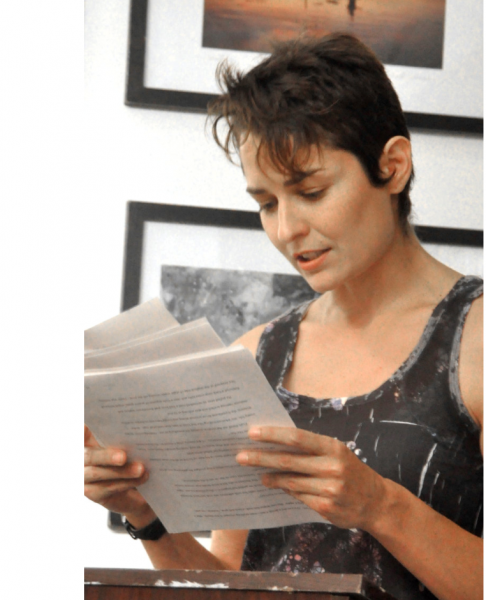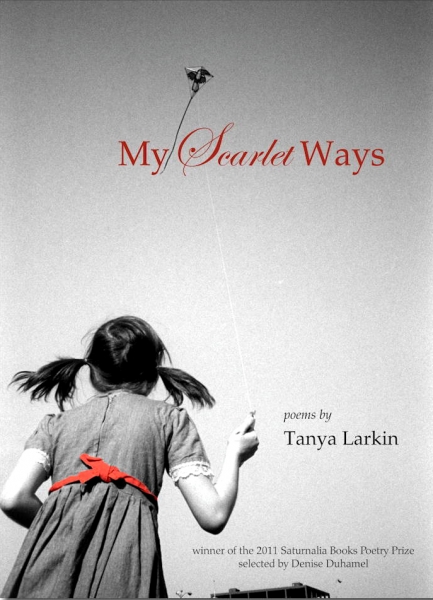Interview of Tanya Larkin as told to Andrea Read
I love your lyric essay "The Path." Do you still walk The Path, and how has your experience of it changed? 
Thank you for reading that poem! I am glad you enjoyed it. Now I can't help thinking of The Path without thinking of my mother, whom I lived with (at Maxwells Green) for a few years. There's not enough of my mother in The Path. She's Italian and enjoys a good passegiata. The Path gave her an opportunity to put some lipstick on and dress up a little even if she was just going out for a brisk walk for exercise—now and then she complained about the lack of style in Boston and Somerville. Don't these people have any self-respect? I tend to agree with her. Why does our attire have to be so logical? I mean it's nice not to be looked at, to have one's thoughts continue, uninterrupted by a look, but also, don't we need to connect in every which way? Also, last year, during lockdown, The Path was my son's lifeline. We were out there when no one was out there. Slush, downpours—we've got the gear. We'd visit neighbors whose backyards abutted the path. My son, observing six-feet of distance, would climb a tree that overlooked our friends' yard or lay on the top of their fence, so he could talk to someone. To them! When I was young, as young as he is now, I grew up in Northeast Philly, a neighborhood of row houses. I remember a good stretch of backyard fences being down and all the children ranging up and down that expanse. That is what The Path is to my son.
In your poem "My Nature," the "no" could come from many places. Before I read your commentary on the origin of the poem, I was imagining the "no" of, say, a two-year old. Here's a two-part question: (1) what do you mean by "a compound 'no'" and (2) how often does the end of a poem come to you and become the thing that guides the rest of the poem?
I know TWO well, also THREE, and FOUR, so I'm on board with your reading of that poem. The addressee is basically a two-year-old; I don't think he'd disagree with that. And I was basically a two-year old with him. When I say "compound," I just mean he said no to me about a couple of non-negotiable things.
don't think he'd disagree with that. And I was basically a two-year old with him. When I say "compound," I just mean he said no to me about a couple of non-negotiable things.
About endings—this used to happen to me when I was a younger poet. I'd come up with a killer last line and then figure out how to get there. That's not exciting to me anymore. I lose interest. These days, I'd have to start out with that last line and that would set up the puzzle of the poem for me. I need there to be something to figure out, I need to create suspense for myself and then move in a field of unpredictability. Therein lies the thrill of writing poetry, right? You never know what you are going to say. This is why a lot of temperaments are not suited toward writing poems. They need to know what they are going to say before they say it. I prefer mystery, moving through the mystery of music (as it is embedded in language).
With respect to your writing, what's inspiring you at the moment? What books are you reading? What art are you looking at? What films or tv shows are you watching?
What inspires me are the poems of Sandra Lim, author of THE WILDERNESS, and THE CURIOUS THING, which comes out this fall (2021, Norton). Elaine Equi says that a poet goes out of her way to preserve a mystery. As poets, in other words, we are trying to keep something alive on the page without wholly knowing what that is. My favorite poets leave the poem before even knowing, themselves, what they are talking about. They MIGHT be able to say, I was getting at the idea of...but, if it's a good poem, they've just given the mystery a more definite shape. It's hard to know how to treat something/how to feed it if one doesn't know what it is, but that's our task nonetheless. That is the poetic task I'm interested in, anyway. Lim's poems have no cheap bids for attention and each move is fresh--not something you've seen before. They move mysteriously, one image glancing off the other to build not just meaning but its sensation. I want to learn from them how to be satisfied with the feeling of closure (rather than conclusion) or better yet to leave off without the need for closure or conclusion at all. You can find Lim's poems here and here. Anyone, I think, will admire her precise light touch and savage honesty.
As for fiction, the one novel I managed to finish during lockdown last year comes out in paperback this week, I believe. ST. IVO by Joanna Hershon. It's short and propulsive--and has an unusual but necessary, or at least necessary-to-me topic—parental guilt and shame. I was relieved to read about someone else who is haunted by parental paranoia. ST. IVO is a thriller that is animated by that and the threat of an unfulfilled life. What I admire about Hershon's work—she keeps getting better and better with each book—is her psychological acuity, nearly all of it enacted and not explained. How she manages to intertwine depth of character and plot, I don't know. Ferrante does this, too.
Joanna and Sandra are dear, dear friends. I have known Joanna since I was sixteen. We used to sit next to each other, against walls in hallways, walls in bedrooms, and write furiously in our journals, the books propped on our knees. Then we would read them to each other. I talk to Sandra nearly every day. "Who are you talking to?" my seven-year-old son asked the other day. "Sandra..." "Sandra, Sandra, Sandra. Love, Love, Love." He's got our number, but it's more like "Sandra, Sandra, Sandra. Love, Love. Love. Poetry. Poetry. Poetry." And not necessarily in that order. These are artistic friendships. There's the work. And there are the friends, and they are inseparable to me.
If you could have a chef to cook for you every day, limited to one cuisine, what would it be?
If someone is going to cook for me every day, he gets to choose.
How did you find your way to Somerville? What are some of your favorite things about the city?
I was a kind of 9/11 refugee and came from Brooklyn less than a year after. The shock and grief of 9/11 easily found expression in a misguided instinct toward marriage. I found solace from both 9/11 and that brief, wild love in the long springs on Spring Hill, my favorite part of the city besides The Mystic, which is much closer to where I live now. Like Brooklyn, Somerville is densely populated with all sorts of interesting people—but its density is hidden and the people skew toward the activist intellectual and writerly, both of which I love. Sometimes I miss the energy passed from hundreds of stranger's eyes—all in one trip to the convenience store or whatnot, that you only get in NY, but by now I know a lot of people and like them and like running into them everywhere. I think of moving closer to woods (a lot) but I would miss the community of artists and writers I am a part of. It's good to belong. It's hard to know what confers more happiness, friends or woods. For right now, I enjoy being a city mouse that dreams of the country. Other things...well-designed playgrounds like Lincoln and Hoyt-Sullivan--I have a soft spot for Dickerman...Mansard roofs, the semi-circular building on Bow Street, the round house (I have a poem about it that starts my second manuscript. It's somewhere online)...Also, Somerville's got a very high walk-score (as celebrated in the Somerville children's book author, Jef Czekaj's Sequestered Storytime video) and attested to in many a David Blair poem—another rockin' Somerville poet.
What are you working on right now? How would you say your poetry has changed from your first book, My Scarlet Ways, to now?
Much of the poetry in MSW is tightly controlled, extremely edited surrealism. And dense! I am much looser and clearer now. Back then, I was dominated by music and image, so much so that sometimes I didn’t even know what I meant at all! Now my struggle is with too much clarity. When I was in graduate school, poets, who were the age I am now, taught us. Maybe that's why they urged us toward difficult, private, nearly opaque language. THEY had entered a period of their career where they didn't want to be too expository or too clear.
For more links and information about Tanya’s work, visit her website.
You can also read her poem “The Round House, Somerville, MA” here.










